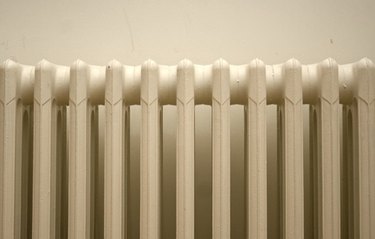Things You'll Need
Towel
Jug
Radiator key

The normal water pressure of a boiler should be between 1 bar (a unit of pressure) and 2.5 bar. The boiler pressure will normally rest at 1 bar when cold and rise to 2.5 bar when in full use. On many newer models, the boiler will be equipped with a cutoff switch to prevent damage to the heating system; should the pressure fall too low or too high, the boiler will shut off. You can reduce the water pressure in your system by bleeding the radiators, which is the same method for all boiler models.
Step 1
Check your boiler pressure on the gauge. When the boiler is on and heating the house, the gauge should not read above 2.5 bar. If the boiler is above 2.5, switch off the system. Let the boiler cool.
Video of the Day
Step 2
Place a towel below the corner of any radiator in the house. The towel should be below the valve, which is usually in the upper-right corner of the radiator.
Step 3
Place a jug directly under the valve to catch water that will be released. Place the radiator key onto the valve and twist clockwise. You will hear a hissing sound, which indicates the valve is being released.
Step 4
Allow the jug to be half-filled, depending on the amount of water that has to be released to lower the pressure. Firmly twist the radiator key counterclockwise to close the valve; you can check the boiler pressure and repeat the bleeding process until the boiler pressure is set at 1 bar.
Step 5
Switch on the boiler. Turn on your central heating and allow the boiler to heat up. Check your pressure after an hour to ensure the water pressure is set at 2.5 bar.
Tip
If your boiler pressure increases again, the filling loop -- a flexible pipe connected to the boiler and a copper pipe with a tap in the middle -- may not be closed. Twist the filling loop counterclockwise to fully close it.
Video of the Day